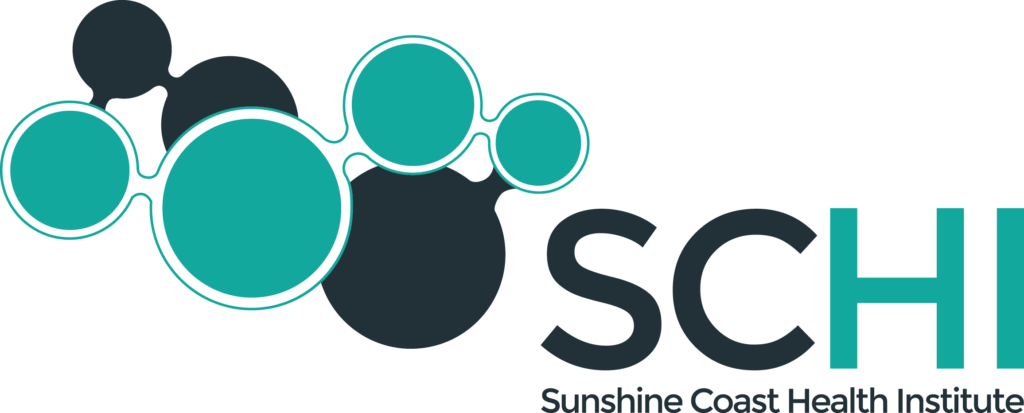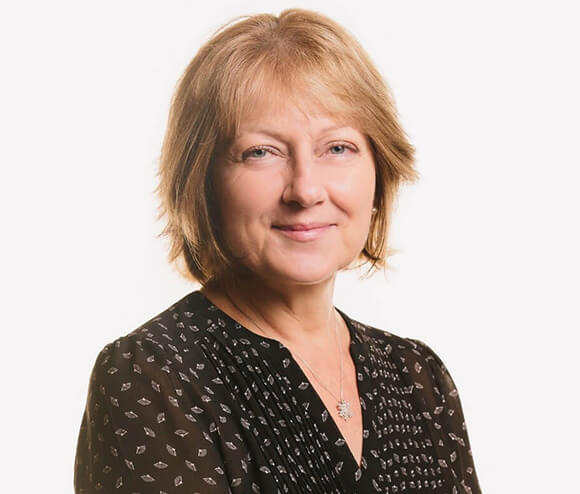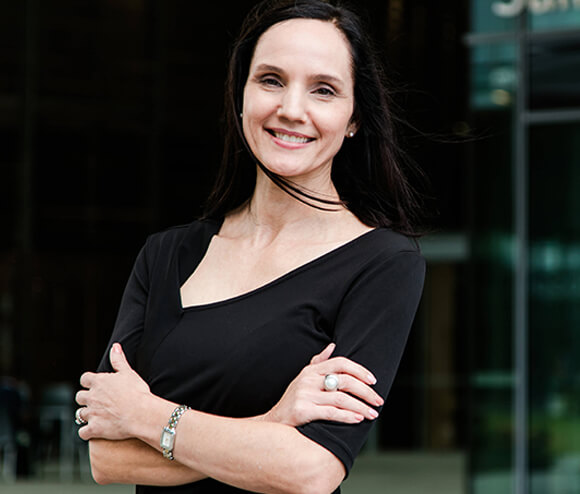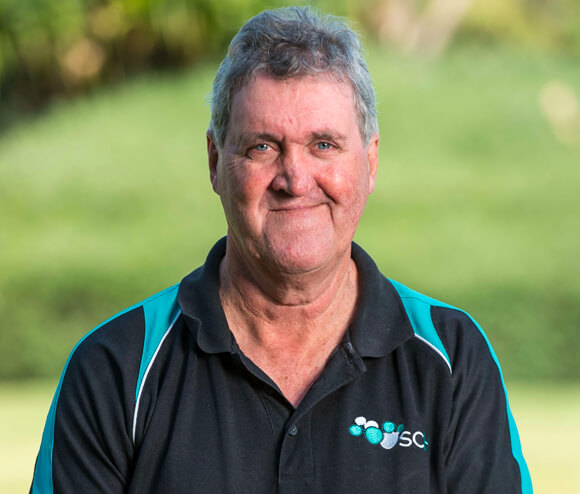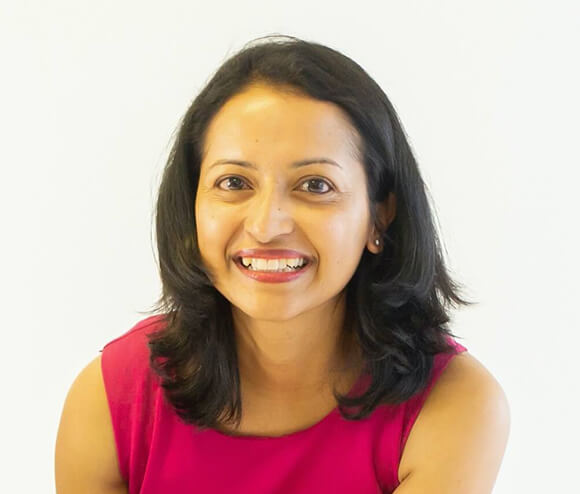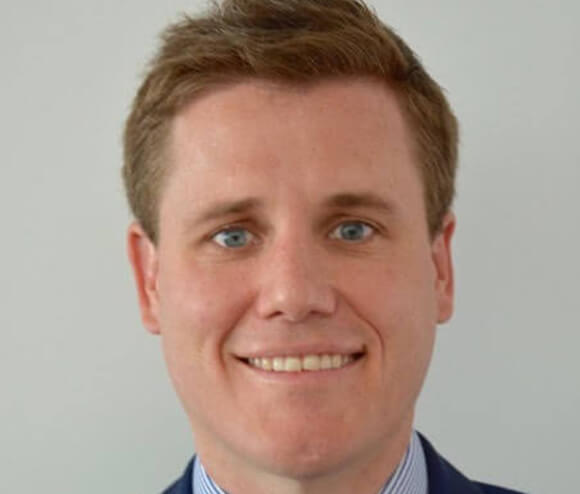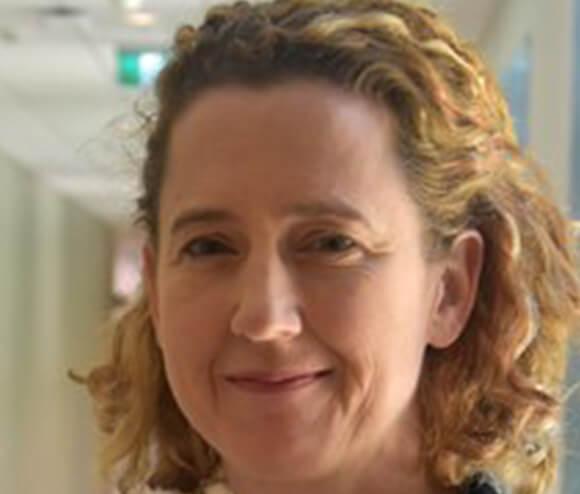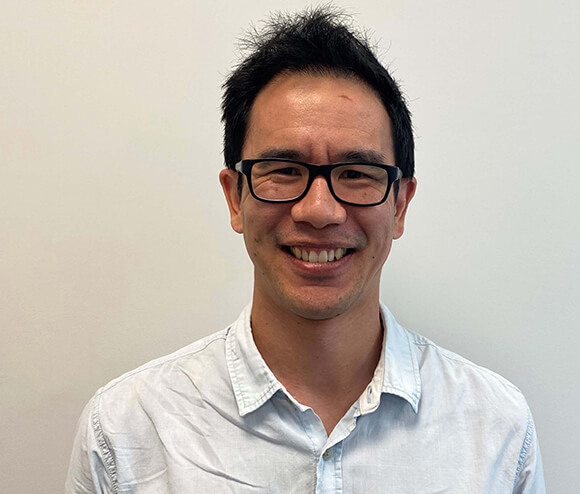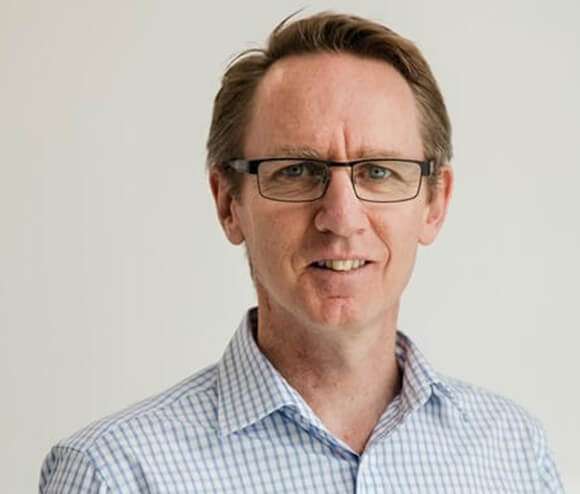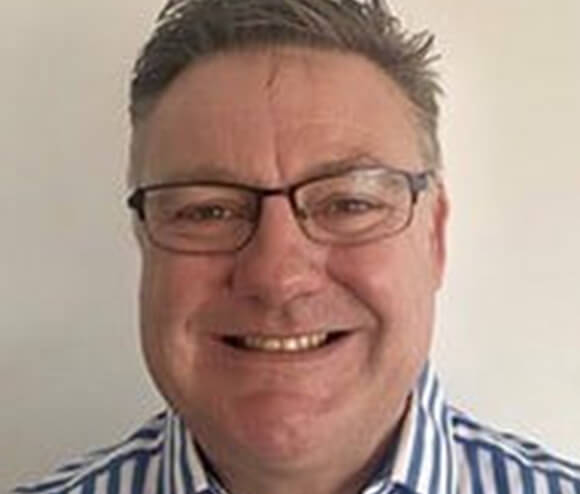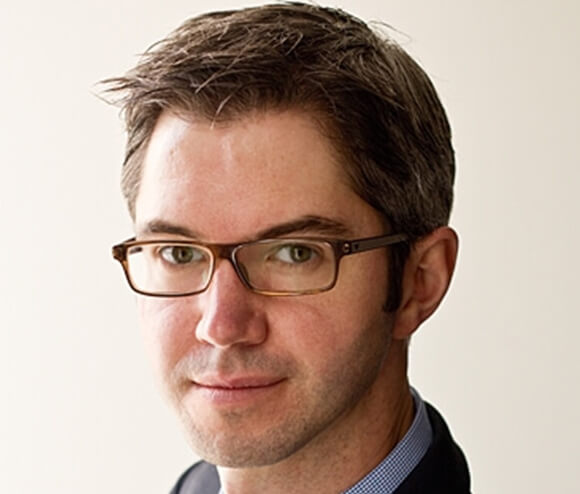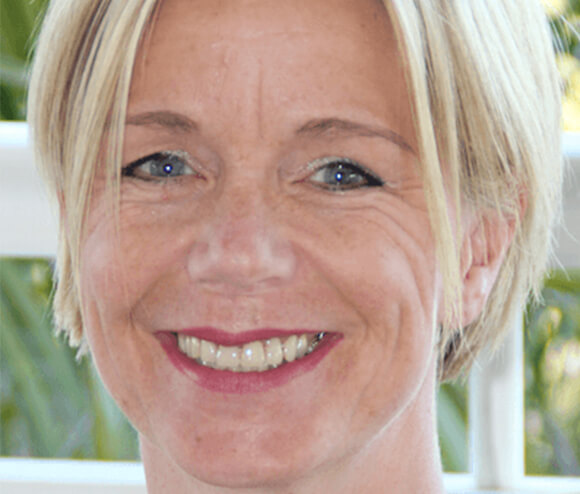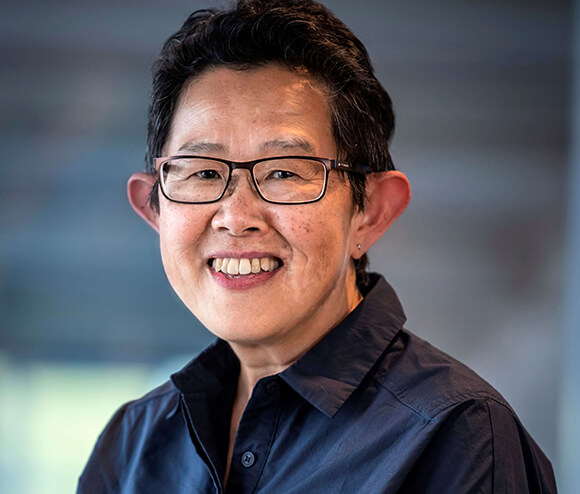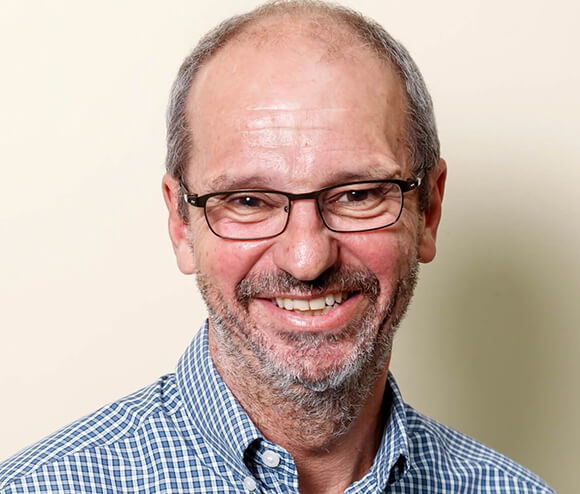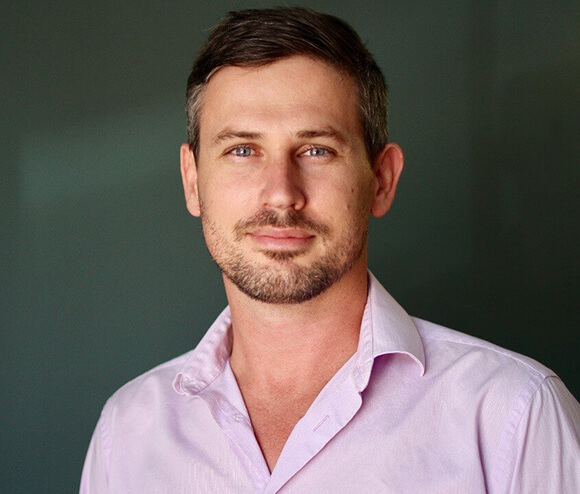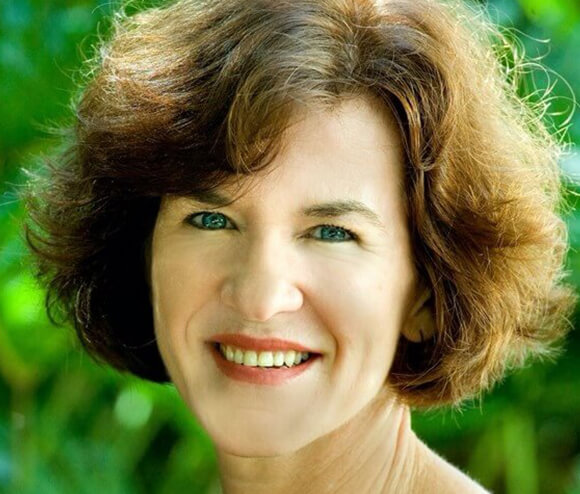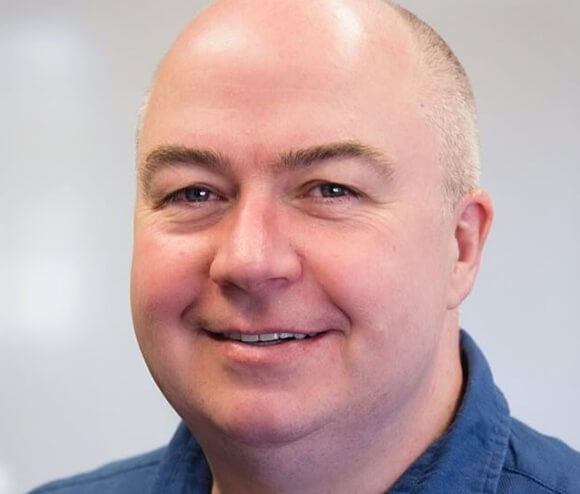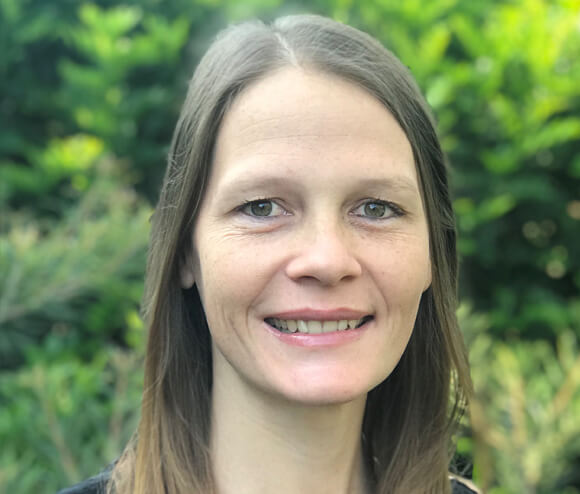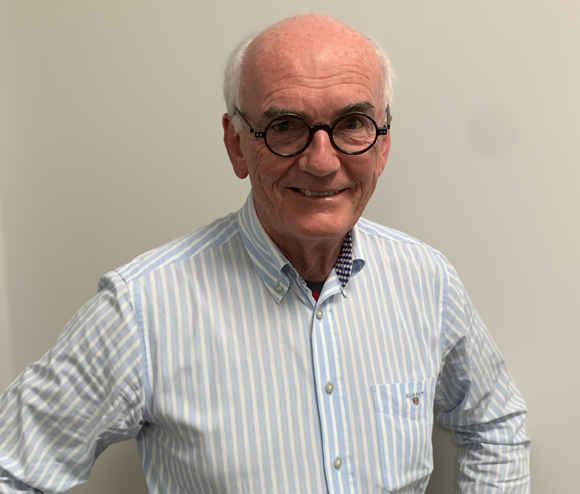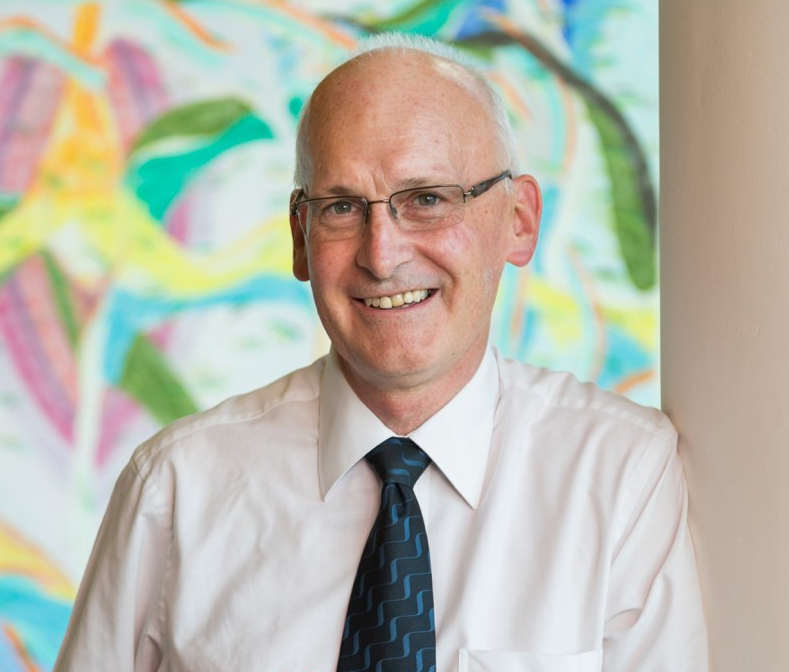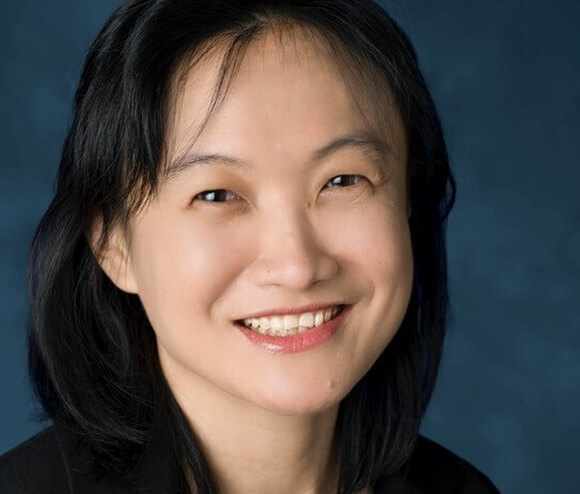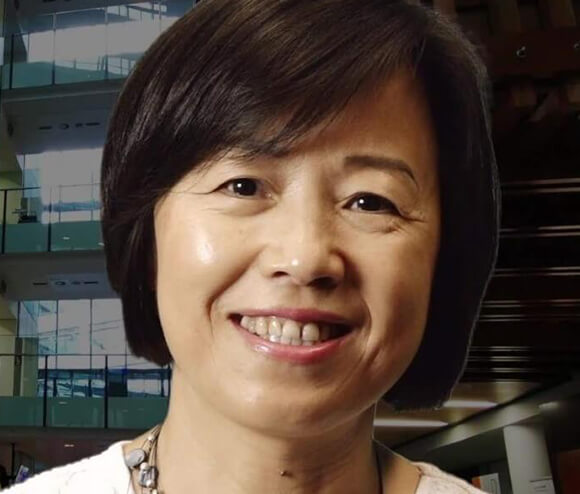Jeanine Young has worked in Australia and the United Kingdom in neonatal intensive care, paediatrics and community child health. Jeanine has a special interest in infant care practices; in particular breastfeeding and parent-infant bed-sharing, and in co-designing practical strategies and resources for safer infant care with families.
Jeanine has established a research program to investigate Queensland’s infant mortality rate, with a focus on evidence-based strategies for health professionals and parents to translate safe sleeping messages into practice and to reduce Aboriginal and Torres Strait Islander infant mortality. In collaboration with Change for our Children New Zealand, Jeanine is the Australian lead for the Pēpi-Pod® Program available in metropolitan, rural and remote Aboriginal and Torres Strait Islander communities. The Pēpi-Pod® Program comprises a portable sleep space combined with safe sleep education as a culturally appropriate strategy to promote safe sleeping and breastfeeding in the context of shared sleeping. This Program has been attributed to the recent reduction in Queensland infant mortality (Queensland Family and Child Commission, 2022) and has been incorporated into the 2022 Queensland Clinical Guideline ‘Safer Infant Sleep’ (which Young co-led) as a targeted strategy for families with young infants who experience vulnerabilities that increase the risk of infant mortality.
Jeanine also initiated the first Australian trial of a sleep enabler suitable for postnatal units to support breastfeeding and promote safer infant sleep environments in hospital (the ESCCaPE trial and mini-ESCCaPE trials) in which the Sunshine Coast Hospital and Health Service was the first pilot site, followed by Calvary Hospital, ACT.
Jeanine works in partnership with government, industry, safety and regulatory bodies, and communities in translating evidence into practical advice for parents. Her efforts in reducing infant mortality through supporting the role of health professionals and health promotion within communities have received state, national and international recognition.
In June 2020, Jeanine was awarded a Member of an Order of Australia (AM) for her significant service to tertiary education, to medical research, and to nursing. In 2022 the research impact of the Pēpi-Pod Program on infant mortality was recognised by a Children’s HealthCare Australasia Medal of Distinction and the UniSC Vice Chancellor and President’s Award for Excellence in Research Impact.
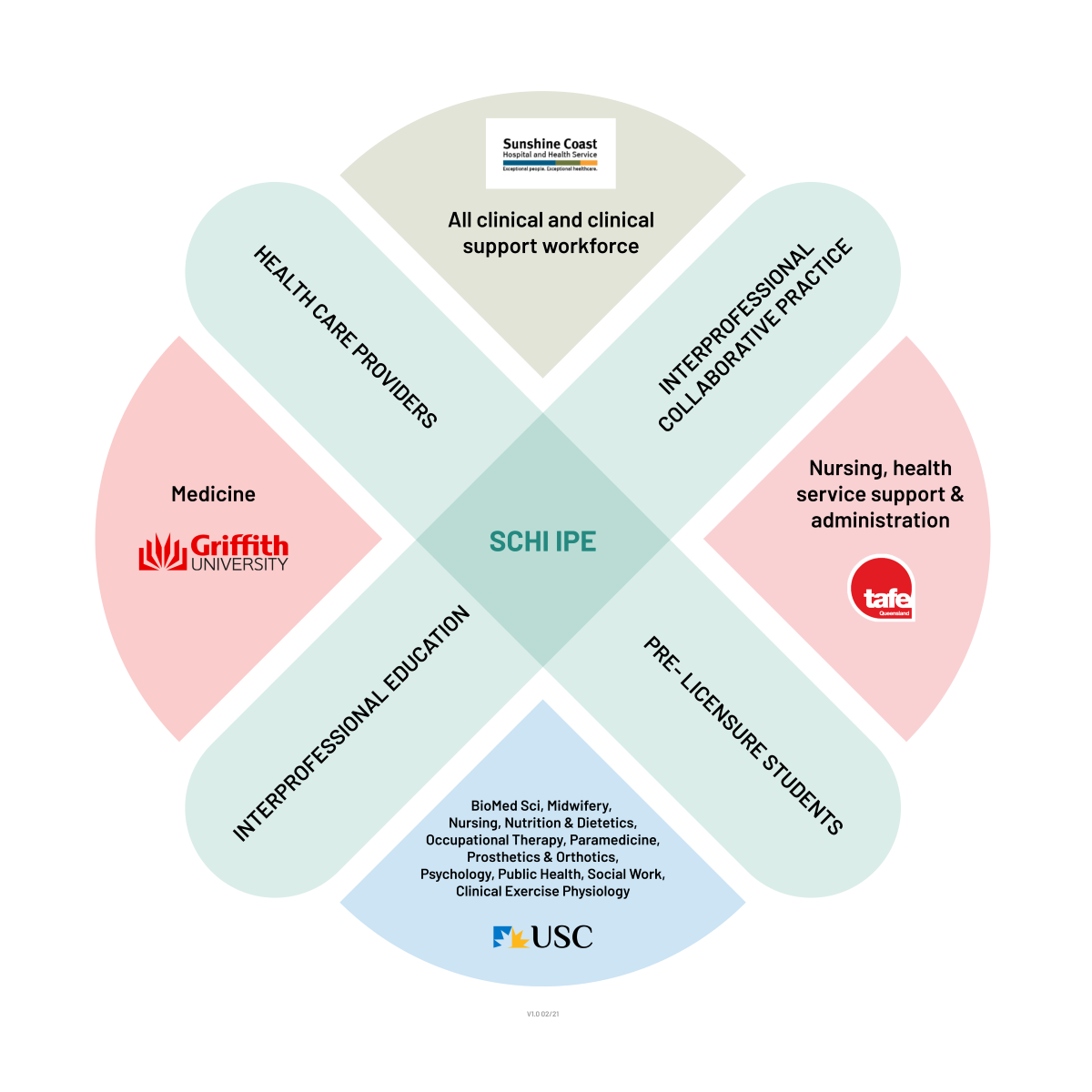
Dr Lauren Kearney is a Senior Lecturer in Nursing and Midwifery within the School of Nursing, Midwifery and Paramedicine, University of the Sunshine Coast. She is currently the Program Coordinator for the Master of Nursing (Clinical Leadership) and Honours Program within the School. Lauren is a registered midwife and nurse, and her clinical background is in paediatrics, maternal and child health nursing, and in more recent year’s midwifery.
Lauren’s teaching expertise is within the postgraduate and higher degree by research areas. Her research track record is strongly focused upon maternal and child health; specifically within the domains of evaluation of models of care (relating to the perinatal period and early years), intravenous fluid management and access during labour and birth, facilitators to promote a positive and physiological spontaneous vaginal birth, management of postpartum haemorrhage, and strategies for enabling closeness between mothers and infants in the postpartum period. Lauren has strong collaborations with the Sunshine Coast Hospital and Health Service.
The recipient of several competitive research grants in the maternal and child health area, Lauren is passionate about improving the experience of health care for women and children through the translation of high-quality evidence into practice.
Lin Fung is the Associate Professor in Medical Laboratory Science and the leader of the OptiBlood research team at USC. The team’s research is focussed on optimising the patient’s own blood resource and the effective use of blood products. The majority of higher degree by research (HDR) projects are transfusion-related and include projects investigating:
• blood management and blood use in older adults
• older adults as blood donors
• blood use in cardiac surgery, major abdominal surgery, and orthopaedic surgery.
Many of these projects are by health professionals completing part-time HDR studies to address questions/problems relevant to their work. These are only possible through close collaboration with local and international clinical colleagues. Anyone interested in HDR or collaborating can contact Lin.
Dr Derek Sarovich is a Senior Research Fellow who joined SCHI in mid-2017. Derek is a molecular microbiologist and bioinformatician and is interested in antibiotic resistance, bacterial pathogenesis, molecular epidemiology, genomics, and transcriptomics. Derek works closely with several clinically focused collaborators to bring next-generation sequencing technologies to the clinical realm, with a focus on improved treatment and diagnostics of antibiotic-resistant bacterial infections, particularly those with high morbidity and mortality.
Morne completed his Anaesthetic training at Chris Hani Baragwanath hospital in Soweto, South Africa before emigrating to Australia. During his time in Bundaberg as Director of Anaesthetics and Intensive Care Unit, Morne was instrumental in the hospital gaining ANZCA accreditation for Anaesthetic specialists training.
In 2011 Morne received an Australia Day medal for contributions made to telehealth. He was Director of Anaesthetics on the Sunshine Coast before becoming the medical lead for safety and quality. During his time as director, Morne completed a Masters in Health Management from the University of New South Wales.
Morne has very strong focus on clinical governance, with particular interest in patient advocacy, clinical engagement and learning from other industries. He is a firm believer in equality of access for all Australians to excellent healthcare. He also serves in the RAAF specialist reserves with the rank of Squadron Leader and is a qualified commercial pilot.
Ingrid is an Advanced Physiotherapist in Acute Stroke/ Neurology and an Early Career Clinical Researcher. She is building a strong, multidisciplinary focused research program aimed to ‘promote early recovery and rehabilitation after stroke’ within the Sunshine Coast Hospital and Health Service (SCHHS). She is a Future Leader within the NHMRC Centre of Research Excellence’ Stroke Rehabilitation and Brain Recovery’ and active in Queensland State-wide Clinical Networks. Her research aims to increase physical, social, and cognitive activity to improve health and reduce the risk of chronic diseases e.g., the effect of environmental enrichment on patients’ activity levels in the acute stroke unit and home-delivered telerehabilitation to enhance physical activities after stroke. Additionally, her research includes work to improve quality of care and health service delivery e.g., embedding a vestibular pathway in the Emergency Department and building efficient and innovative rehabilitation models to promote recovery.
Chris Askew is an Associate Professor of Clinical Exercise Physiology at the University of the Sunshine Coast. He also holds a conjoint role as Principal Research Fellow (Cardiovascular Health) with USC and the Sunshine Coast Hospital and Health Service. He leads the SCHI Healthy Ageing Research Cluster and is a co-leader of the VasoActive research group. The VasoActive research group includes clinical and academic researchers from various disciplines, including cardiology, vascular surgery, biomedical science, nutrition, nursing, and exercise physiology. The group’s work ranges from experimental and mechanistic studies to interventional trials that aim to improve cardiovascular health.
Chris is an Accredited Exercise Physiologist with a particular interest in vascular and microvascular dysfunction and the impact this has on physical and cognitive capacity in older adults and people with chronic conditions. His research aims to develop new exercise and therapeutic strategies that target vascular function, and thereby improve functional capacity and quality of life. Much of his research has focused on peripheral arterial disease (PAD) – which causes blockages in the arteries of the legs. His work also includes studies in people with heart disease, abdominal aortic aneurysm (AAA), diabetes, and liver disease, as well as studies of brain vascular function to better understand the role of exercise in the prevention of cognitive impairment and dementia.
Dr Timothy Baird is a Respiratory and Sleep Physician on the Sunshine Coast. Additional to his specialist training, Dr. Baird has completed a Diploma of Tropical Medicine and Hygiene and an international fellowship within the Cambridge Centre for Lung Infection at the Royal Papworth Hospital, United Kingdom. Dr. Baird has an interest in bronchiectasis and respiratory infections and has published several articles in this field. His active research includes projects looking at next generation diagnostics in COPD and lung cancer infections, exploration into COVID-19 host response and associated co-infections, and treatment-based studies for bronchiectasis and non-tuberculous mycobacterial disease.
Dr. Ahradha Subedi is an infectious disease physician, a clinical microbiologist, and the clinical lead for Infection Management Services, based at Sunshine Coast Hospital and Health Service. Her research interest includes the development and validation of rapid and innovative laboratory methods to detect antimicrobial resistance, microbial genomics, healthcare-acquired infections, and endovascular infections. Her current research projects include:
• whole genome sequencing to evaluate within host diversity of Staphylococcus aureus’ in collaboration with research partners at the Menzies School of Health Research, Northern Territory and the University of the Sunshine Coast (USC)
• infective endocarditis prospective and retrospective review over ten years
• the ACF project – a quality improvement initiative to improve intravenous cannula related blood stream infections in the SCHHS.
Hattie is an Accredited Practising Dietitian and senior lecturer in Nutrition and Dietetics at USC where she leads the medical nutrition therapy stream and coordinates several dietetic courses. She is also a Visiting Research Fellow at SCHHS and serves on the SCHI Education Advisory group that provides strategic advice and facilitates the planning and delivery of education, including inter-professional practice capability at the SCHI. Hattie serves on the state-wide Allied Health-Translating Research into Practice (AH-THRIP) showcase and recognition working group as a University staff representative. As an educator in a professional degree, her teaching and learning scholarship focuses on authentic learning experiences to bridge the gap between theory and practice, develop critical thinking skills, as well as improve graduate employability. She uses an integrated learning approach, focused on embedding simulation and technology into the curriculum to enhance students’ ability to apply their knowledge and evolve their problem-solving skills. She recently developed an online serious game simulating the delivery of nutrition care in a safe learning environment and serves as familiarisation to the acute care setting. In 2017 she introduced simulation as part of the USC dietetic curriculum, which was made possible through access to the SCHI simulation laboratories and has since developed a keen interest in inter-professional education and learning.
Mia is a Senior Lecturer in Physiology at the University of the Sunshine Coast, where she co- leads the Bachelor of Biomedical Sciences Program, teaches undergraduate coursework, and supervises research students from Honours to Doctoral level. Mia’s research investigates the biomarkers and potential mechanisms underpinning the benefits of exercise and other lifestyle interventions for improving cognition and reducing the risk of dementia in older adults and high-risk groups, including patients with Type 2 Diabetes and Mild Cognitive Impairment. Her work extends from laboratory studies to clinical trials and community implementation studies with a translation focus. Her research has attracted more than $5.5M in competitive research funding as Chief Investigator since 2015, including from the NHMRC.
Prior to joining USC, Mia completed her postdoctoral training in exercise, ageing and cognitive decline at the Queensland Brain Institute. She established the UQ Centre for Exercise and Healthy Brain Ageing, which facilitates ongoing research into the effect of exercise on cognitive health in older adults. By combining measures of physiological and functional fitness, cognitive function, blood biochemistry, epigenetics, and multimodal magnetic resonance imaging of the brain, she investigates how lifestyle intervention can improve brain health and slow, prevent, or even reverse cognitive disease progression in older adults.
Dr. Nick Gray completed his medical degree at the University of Adelaide and is currently Director of Renal Medicine at the Sunshine Coast Hospital and Health Service (SCHHS). He is a member of the Australasian Kidney Trials Network Haemodialysis steering committee, Chair of the Australia and New Zealand Society of Nephrology (ANZSN) KPI Workgroup, and Deputy Chair of the Australia and New Zealand Dialysis and Transplant Registry (ANZDATA) Advisory Committee. Previous appointments include Chair of the SCHHS Research Council, and Chair of the Royal Australasian College of Physicians advanced training committee in nephrology. Nick has been awarded over $1.5million in research funding. Research interests include disadvantaged populations with kidney disease and haemodialysis.
Fiona Bogossian is Professor of Practice Education in Health and Academic Lead at the USC Clinical School – Sunshine Coast Health Institute. Fiona is a Registered Nurse and Midwife with clinical, policy, education, and research experience in midwifery and neonatal nursing. She has qualifications in education, public health and epidemiology, and a strong track record in academic mentorship. Fiona is a Churchill Fellow, a Fellow of the Australian College of Midwives, and a Senior Fellow of the Higher Education Academy.
Prior to her appointment at USC, Fiona was a foundation academic in the UQ School of Nursing and Midwifery (2005-2018), where she pioneered Queensland’s first Bachelor of Midwifery program and designed and implemented UQ’s first practice-based electronic portfolio. Fiona’s expertise spans clinical, health services, and education research in particular longitudinal cohort studies, randomised trials, qualitative approaches, and mixed methods. She has $3m in grants since 2009, and over 100 peer reviewed publications.
Fiona’s disciplinary leadership is demonstrated at national and international levels through a long history of ministerial appointments, membership of research foundation grants committees, accreditation panels, as Sub-Editor for Women and Birth, on U21 Health Sciences Group Executive (2013-2016) and the ARC – ERA Impact and Engagement Pilot (2107).
Associate Professor Jo Wu in Nursing at the University of the Sunshine Coast (USC) is the Leader of USC Nursing, Midwifery and Paramedicine Research Group (NURTURE). Jo has led multidisciplinary teams and has made a significant contribution to promoting self-management for patients with coronary heart disease and diabetes. Her contributions have been awarded a Bronze Medal from the European Society for Person Centred Healthcare. Jo is currently collaborating with clinicians, national and international researchers toward further studies on promoting self-management. Planned projects include refinement of the cardiac-diabetes program, incorporating IT (i.e. telephone, SMS, AI) and peer supporters in the delivery of the program, evaluating these delivery modes for transitional care, and undertaking the intervention in different cultural contexts. Jo has been awarded several research grants, published papers in refereed journals. She has been an expert panel reviewer, reviewer of peer-reviewed journals, textbook chapters and competitive research grant applications, as well as being on the Editorial Board ofInternational Nursing Review (official Journal of International Council of Nurses, ICN), and as Editorial Advisor of Nursing and Health Sciences journal; Chair of JBI Expert Reference Group (ERG), Cardiovascular Field. She supervises higher degree research students, providing mentorships to academics and clinicians.
Associate Professor Erin Price is a microbiologist, molecular geneticist, and co-lead of the Pathogen-Omics lab team at USC. A/Prof Price is also the Infectious Diseases and Antimicrobial Resistance (ID&AMR) Cluster leader at SCHI. The Pathogen-Omics lab investigates the transmission, antibiotic resistance potential, prevalence, and evolution of microbial pathogens affecting humans, with a focus on pathogens associated with chronic respiratory diseases. A/Prof Price has a keen interest in applying microbial genomics and transcriptomics to better understand, diagnose, and treat infectious diseases. She has extensive experience using comparative genomics to develop inexpensive, sensitive, and accurate real-time PCR diagnostic assays to target important microbes and their antimicrobial resistance potential. Her current studies include using metagenomics and metatranscriptomics to characterise the airway microbiome of people with chronic obstructive pulmonary disease (COPD), with a view to improving the diagnosis and treatment of infections that drive disease, and identifying the causes of secondary bacterial/fungal pneumonia and immune dysregulation in COVID-19 patients (the CoViBac study) in collaboration with clinical partners at Sunshine Coast University Hospital. She has previously held post-doctoral research positions in Arizona and Darwin investigating the population biology, antimicrobial resistance, and evolution of high-threat bacterial pathogens.
Mark Kelly is the Simulation Centre Manager for the Sunshine Coast Health Institute. His main work interests are developing colleagues, supporting Interprofessional Training, and improving staff rostering patterns to support work-life balances. Mark is responsible for the day to day operations of the SCHI simulation suites, attending to the needs of the four partners that make up Sunshine Coast Health Institute. This varies from the undergraduate students’ requirements through high technology hi-fidelity simulations conducted by the inter-professional groups within the Sunshine Coast Hospital and Health Service. His clinical background is in Intensive Care Nursing, and he has tutored in the Bachelor of Nursing program at University Sunshine Coast.
Professional Contributions and Initiatives:
• facilitator for the National Health Education and Training (NHET). Inter-professional module for Simulation-based education
• co-developed a simulation based inter-professional education program for the partners of Sunshine Coast Health Institute (SCHI). This program was centred on the management of the deteriorating patient
• collaborated with University Queensland, University Sunshine Coast, and the physio department within the local Sunshine Coast Health Service to undertake an inter- professional undergraduate research project to identify the roles of the different professions, their scope of practice, their teamwork and communication strategies
• developed a workforce’ Train the Trainer’ program for speech pathology to undertake tracheostomy suctioning, which is adopted across several other health services in Queensland. A research project was conducted at the Queensland University of Technology to measure the efficacy of the change in practice
• completed accreditation guidelines for Sunshine Coast Hospital and Health Service (SCHHS) simulation skills centre Commedia dell’Arte (CdA) as part of Health Workforce Australia (HWA) initiatives.
• development of a conference presentation for the ACCN Conference Gold Coast Introduction of 12-hour Shifts into ICU, NGH
• Project Officer – Seconded to the private sector to operationalise a new Intensive Care Unit
• Project Officer – Lead role in developing a strategy for the implementation of 12-hour shifts into ICU at Nambour Hospital GH. This also included coordinating and liaising with the Victorian Institute of Research to evaluate the trial.
Dr Keat Choong graduated from the University of Auckland Medical School and completed his Infectious Diseases training at Princess Alexandra Hospital and Sullivan Nicolaides Pathology. He is currently the Clinical Director of Infectious Diseases for Sunshine Coast Hospital and Health Service. In this role he strives to foster departmental research and collaborations with other institutions. Dr Choong’s current research interests include management of diabetic foot infections and antimicrobial resistance.
Dr Choong has worked with the health service for the past nine years. He is a fellow of the Royal Australian College of Physicians and a senior lecturer in medicine for Griffith University. Dr Choong is passionate about antimicrobial stewardship and is also a member of Australasian Society of Infectious Diseases, Australian Society of Antimicrobials, and the European Society of Clinical Microbiology and Infectious Diseases
Marianne Wallis is an Adjunct Professor of Nursing at the University of the Sunshine Coast (USC) and Griffith University Menzies Health Institute Queensland. She is a past USC Associate Dean (Health) and Deputy Head of School of Nursing, Midwifery and Paramedicine. Marianne is also a Visiting Research Fellow with Sunshine Coast Hospital and Health Service. Marianne was the Foundation Professor in Clinical Nursing Research at Griffith University and Gold Coast Health.
Marianne has been a Chief Investigator in numerous large projects that have aimed at improving the outcomes of hospitalised patients. She was a Chief Investigator on the first NHMRC Centre for Research Excellence focused on Nursing (located at Griffith University). The main foci of Marianne’s research are nursing interventions in hospitalised patients (especially vascular access and wounds) and health services research (especially management of older adults in the ED). Marianne has written over 200 scientific publications and reviews for six major research funding bodies in Australia and overseas and for more than ten Australian and international peer-reviewed journals. Since 2000, Marianne and her colleagues have attracted over $11m in research funds for projects that involved collaboration with a range of industry partners.
Associate Professor Frances Lin is an experienced acute and critical care researcher and educator. Her research expertise and interest are in implementation science and designing complex interventions to improve patient safety and quality of care. In collaboration with clinicians and other researchers, Dr Lin has been focusing on translating research evidence into clinical practice and improving patient care in acute and critical care settings in the last decade. Collaborating with others and helping health services/organisations to build capacity are key features of Frances Lin’s work.
Frances is a Senior Fellow of the Higher Education Academy, and a Fellow of Australian College of Critical Care Nurses. She has extensive experience in designing and delivering online and face to face acute and critical care education programs. Frances is a dedicated educator and mentor who invests her time and energy tirelessly for students’ success. She has supervised and mentored many of her students who have become successful senior clinicians and researchers over the years.
Frances holds the position of Associate Professor in Nursing at the University of the Sunshine Coast. She is a member of the Sunshine Coast Health Institute and a Senior Visiting Research Fellow of Gold Coast Hospital and Health Services. Frances also holds the position of Adjunct Associate Professor position of School of Nursing and Midwifery, Griffith University. She was the first person being awarded the prestigious Chair Professor of Nursing at Peking University First Hospital; and a Visiting Professor of Zunyi Medical University, China.
Professor Keith Grimwood is Deputy Head of School (Research) and a joint appointment as Professor of Infectious Diseases at Griffith University and Gold Coast Health. Previously, he was a Senior Lecturer in Paediatrics at the University of Melbourne, Professor of Paediatrics at the University of Otago-Wellington, Conjoint Professor of Paediatrics at the University of Queensland and Inaugural Director of the Queensland Children’s Medical Research Institute. As a clinical researcher, he has published more than 320 papers, book chapters, and reports covering respiratory viral and gastrointestinal infections, pneumonia, cystic fibrosis lung disease, Pseudomonas aeruginosa, bronchiectasis, meningitis, urinary tract infections, and vaccine-preventable diseases.
Associate Professor Edward (Ted) Weaver is currently a Senior Medical Officer within the Department of Obstetrics and Gynaecology at Sunshine Coast University Hospital. He is an Associate Professor in the Departments of Obstetrics and Gynaecology, University of Queensland (UQ) and Griffith University (GU). He is the Clinical Sub-Dean GU School of Medicine Sunshine Coast.
He has been a member of the Sunshine Coast Hospitals and Health Board from 2014-19 and sits on various Board Committees, including Safety and Quality and Finance and Performance. He is a member of the Clinical Council at SCUH. In 2001, he was awarded an Honorary Fellowship of the Australian College of Midwives in recognition of work developing collaborative systems of maternity care. To date, he is the only obstetrician in Australia so honoured.
From 1990-2011, he was a private specialist in obstetrics and gynaecology in Nambour and visiting medical officer at Nambour General (NGH) and Nambour Selangor Private Hospitals (NSPH), and was responsible for the design and development of a new birth centre at NSPH hospital, which opened in 1997. He was President of the Royal Australian and New Zealand College of Obstetricians and Gynaecologists (RANZCOG) from 2008-2010, during a time of significant maternity care reform in Australia. He is currently a committee member of the Education Strategy Committee and Deputy Chair of the Qld Training Accreditation Committee in Qld for RANZCOG. He is a member of the Recognition of Medical Specialists committee of the Australian Medical Council.
In 2011, Ted was awarded the University of Queensland Medical Society and School of Medicine Distinction in Clinical Teaching Award for the Sunshine Coast Clinical School, and in 2012, the Teaching award for excellence in teaching throughout the UQ School of Medicine. In 2016, he was awarded an Order of Australia Medal for contributions to Medicine and Medical Education and an Australia Day Achievement Award for excellence in healthcare. His current research interests include clinical resilience assessment and training in vocational medical trainees, reducing severe maternal morbidity in maternity care, and the development of peer-assisted case-based learning in postgraduate medical education.
Roni Cole works as is a Paediatric Clinical Nurse on the Children and Adolescent Unit and also Nurse Researcher for the Women’s and Families Service Group at SCUH. She is currently completing a Ph.D. at USC. Roni has a special interest in infant and child health promotion and neonatal and paediatric acute care nursing. Roni is committed to improving the experiences of children and their families during their healthcare journey, empowering families to make informed decisions through the translation of high-quality evidence to achieve the best possible health outcomes.
Professor Robert Harvey specialises in cell biology, neuroscience, and molecular genetics. His research career has focused on the biological roles of synaptic receptors, transporters, and accessory proteins in health and disease utilising animal and cellular models, genetics, next- generation DNA sequencing, and molecular modelling. His work on the biological and therapeutic roles of glycine receptors has revealed key roles for different receptor subtypes in movement disorders, cortical neuronal migration, inflammatory pain sensitisation, and rhythmic breathing. At the Sunshine Coast Health Institute, he aims to investigate the molecular pathology of defects in inhibitory and excitatory synapses in individuals with autism, intellectual disability, and epilepsy (funded by the NHMRC). He aims to translate basic science discoveries into clinical applications, such as improved genetic diagnostics, patient care, and novel pharmacotherapies.
Michael is a physiologist with a special interest in the mechanical properties of blood. He focuses his works on furthering understanding of how exercise can improve mechanical properties of blood, while also examining the detrimental effects that lifesaving medical devices can have on blood so that he can work towards improved outcomes from cardiac surgery. His team spans multiple disciplines, incorporating mechanical and medical engineers, medical disciplines such as cardiac surgery and anaesthesiology, and science disciplines spanning physiology, biophysics, and molecular biology. He feels fortunate to work with leaders in the USA, Germany, Turkey, and Japan, and also his team of enthusiastic and bright young scholars. Together with his team, Michael works with industry leaders in artificial life support and cardiac prosthetics. He has a particular passion for science communications and takes time out to speak with school and community groups – particularly in remote Queensland. He is a recent recipient of a Tall Poppy Award from the Australian Institute of Policy and Science.
Norman Morris is a physiotherapist who holds a joint research position as Professor (Cardiothoracic) at The Prince Charles Hospital, Brisbane, and Griffith University on the Gold Coast. His program of research examines the factors that limit and interventions that improve exercise tolerance in individuals with chronic heart and lung disease. He has previously held the role of Discipline Lead of Physiotherapy and Deputy Head Research, School of Allied Health Sciences at Griffith University. He has published over 100 peer- reviewed manuscripts; obtained both local, national, and international research funding support and supervised over 17 higher degree students to completion.
Professor Tony Stanton is a Senior Staff Specialist in Cardiology at SCUH. He has a particular interest in non-invasive cardiovascular imaging. He became Head of the Cardiovascular Imaging Research Group at the University of Queensland in 2011. His research interests include the interaction between multisystem disease and cardiovascular disease, the use of imaging to detect subclinical LV function, and the assessment of cardiovascular risk. Professor Stanton holds current NHMRC and Heart Foundation research grants and regularly reviews grants for both funding bodies. He is one of the current Cardiac Imaging Section Editors of the Heart, Lung, and Circulation Journal.
Professor James O’Beirne is a UK trained hepatologist with extensive experience in clinical research. He trained in hepatology at the Royal Free and King’s College Hospitals, UK, and was awarded an MD from the University of London for research into the dendritic cell immunotherapy of hepatocellular carcinoma (HCC) in 2007. He is currently Professor of hepatology at the University of the Sunshine Coast and Senior Staff specialist in Hepatology at Sunshine Coast University Hospital.
O’Beirne has an international reputation in portal hypertension, HCC, and other complications of cirrhosis. He was a founder member of the EASL-CLIF chronic liver failure consortium and was a faculty member for the international Baveno Consensus conference for portal hypertension. His clinical research has led to significant advances in the understanding and management of the complications of chronic liver disease such as the use of stenting for variceal bleeding, adrenal dysfunction in cirrhosis, assessment of liver function in liver cancer, and the role of infection in the natural history of cirrhosis. Currently, he is PI on a number of commercial and investigator-led studies in liver disease including HCC, Primary biliary cholangitis, Hepatitis B virus infection, and NAFLD. He has authored 110 peer reviewed publications in the field of hepatology (H-index 31) in addition to numerous chapters. The NHMRC recently funded him for a randomised trial of a novel model of care for patients with NAFLD.
Associate Professor Fraser Russell obtained his Ph.D. in Pharmacology at the University of Melbourne (1994). He completed successful postdoctoral studies at the University of Cambridge (UK; 1994-1998), University of Otago, NZ (1998-2000), and Queensland University, Australia (2000-2004). In 2005 he obtained an academic position in the School of Health and Sport Sciences, University of the Sunshine Coast. His research is in the field of cardiovascular pharmacology. Fraser is the Lead Investigator within a Cooperative Research Centres (CRC) “Honey, Health and Product” node to discover anti-inflammatory and antioxidant activity of bioactive constituents of Australian Honeys. He is also Lead Investigator of a randomized, placebo-controlled clinical trial investigating the efficacy of omega-3 fatty acids in patients with abdominal aortic aneurysm.
Associate Professor Jennifer Broom is an Infectious Diseases Physician and the clinical lead of an extensive research programme that focuses on the social and cultural factors that contribute to antibiotic overuse and misuse. She collaborates with other hospitals and universities in Queensland and nationally (University of Sydney, UNSW, Sunshine Coast University, Prince of Wales Hospital Sydney). A/Prof Broom also has an interest in research around the quality of care in HIV infection. As a clinician-researcher, A/Prof Broom brings clinical relevance and direct translation to the research programmes she participates in. The social influences on antimicrobial use have been incorporated in a multisite intervention to increase compliance with surgical antibiotic prophylaxis guidelines.
With a strong background in medical education assessment, Jen’s focus is on developing closer alignment between studying to pass medical school and learning how to be a great doctor. Through engagement with clinical staff and colleagues from partner institutions, Jen is working towards the development of early clinical exposure pathways for medical students and embedding interprofessional learning opportunities within these settings. Jen is fanatical about delivering teaching in accordance with active learning principles and aims to inspire students to provide top-quality patient care.
As General Manager, East Coast region of TAFE Queensland, Ana leads a multi-campus, multi-discipline education and training organisation offering qualifications and skill sets to over 12,000 students annually. With 28 years of experience in the VET sector in Far North Queensland, Sunshine Coast, and the Wide Bay Burnett, Ana has in-depth knowledge of the challenges and opportunities for regional Queensland in a rapidly changing socio-economic landscape. Since 2013, Ana has contributed to the development and success of the Sunshine Coast Health Institute. Prior to her current role, Ana held the position of Executive Director Education and Training in the East Coast region and Wide Bay, with an earlier role at TAFE North as Chief Financial Officer and Director of Corporate Services, amongst others. Ana is proud to lead a staff of dedicated and skilled teachers and an organisation that is committed to serving students and the community. She is a passionate advocate for vocational education and training, noting the remarkable difference it makes to people’s lives.
